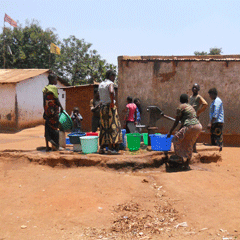[8 May 2013] -- Policy makers and communities in Malawi have opened a national dialogue on tenure security. The dialogue is expected to feed into the urban policy development process that is currently underway in the southeast African nation.
The issue of tenure security is a critical one in Malawi, where rapid urbanisation is having a major impact on land management. The existing frameworks are unable to accommodate the growing informal sector, which comprises more than 70 percent of the urban population. As such, there are a number of policy and legal land-related initiatives currently winding their way through the Malawian Cabinet.
In order to ensure that the urban poor have a voice in the process, the Malawian NGO Centre for Community Organisation and Development (CCODE) facilitated a National Tenure Dialogue to bring together representatives from all stakeholder groups to discuss tenure influence on urban policy and slum upgrading in Malawi.
Held on 18 February 2013 in Lilongwe, the dialogue brought together top government officials, local authorities, federations of the urban poor, and communities to discuss tenure issues. Overall, state stakeholders clearly saw the value of engaging directly with communities, with one official committing to holding frequent roundtables with poor residents on the spot.
The Central Government was clearly committed to the event. Principal Secretary of the Ministry of Land and Housing Mrs. Ivy Luhanga delivered the opening remarks, pledging the Government’s support in providing the necessary legal framework, policy and conducive environment for equitable access to land and security of land tenure.
The range of participants ensured that the debate was balanced and constructive. One of the liveliest parts of the discussion focused on the impact of urban expansion on customary land, a key issue in slum upgrading across Africa. Much of the debate centred around unclear land governance mandates, which leave some settlements in a murky area between city or district councils. Also discussed was the role of traditional chiefs in upgrading and in upgraded settlements.
Documenting Land Management in Lilongwe's Slums
The event also served as an occasion to disseminate findings of a tenure security study of two slum settlements in Lilongwe (Chinsapo and Mtandire). Carried out by the South Africa-based Urban LandMark in partnership with CCODE, the study—referred to as the Operation of the Market study—examined how the urban poor in those settlements access, hold and trade land.
These studies are quickly becoming an important tool in slum upgrading. By documenting land management practices, it is easier to advocate for their recognition and legitimacy—an important component of meaningful upgrading and secure tenure.
In Lilongwe, the study built on initial enumeration undertaken by CCODE in Chinsapo and Mtandire. This process had revealed that two-thirds of residents in those settlements are renters, enabling the team to adapt the survey instrument for the market study accordingly.
Some of the study’s key findings included:
-- An informal market exists that enables households to trade and hold land, both on an ownership and rental basis.
-- Friends and relatives play an important role in identifying the place to live and in ensuring that contractual arrangements will be valid (and in resolving disputes).
-- The Chief plays a role in respect of the ownership market but significantly less so in respect of the rental market, which is between a landlord and tenant.
-- In respect of ownership, rights to properties are obtained for most respondents through an agreement witnessed by the Chief or a document given to them by the Chief.
Both the Malawi market study and the National Tenure Dialogue are part of the Tenure Security Facility Southern Africa initiative, which is financed through the Cities Alliance Catalytic Fund and implemented by Urban LandMark.

Water point supplied by NGO in Mtandire, Malawi.
Presentations
Land Administration in Malawi (Ministry of Lands and Housing)
How poor women and men access, hold and trade land in Lilongwe, Malawi (Urban LandMark)
Tenure perspective (Urban LandMark)




